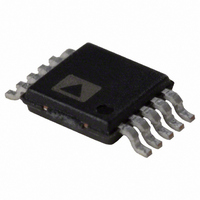AD7685CRM Analog Devices Inc, AD7685CRM Datasheet - Page 20

AD7685CRM
Manufacturer Part Number
AD7685CRM
Description
IC ADC 16BIT PSEUDO-DIFF 10-MSOP
Manufacturer
Analog Devices Inc
Series
PulSAR®r
Datasheet
1.AD7685BCPZRL7.pdf
(28 pages)
Specifications of AD7685CRM
Design Resources
Parametric Measurement Unit and Supporting Components for PAD Appls Using AD5522 and AD7685 (CN0104) Integrated Device Power Supply for PAD with Output Voltage Range 0 V to 25 V (CN0130)
Number Of Bits
16
Sampling Rate (per Second)
250k
Data Interface
DSP, MICROWIRE™, QSPI™, Serial, SPI™
Number Of Converters
1
Power Dissipation (max)
15mW
Voltage Supply Source
Single Supply
Operating Temperature
-40°C ~ 85°C
Mounting Type
Surface Mount
Package / Case
10-TFSOP (0.118", 3.00mm Width)
For Use With
EVAL-AD7685CBZ - BOARD EVAL FOR AD7685
Lead Free Status / RoHS Status
Contains lead / RoHS non-compliant
Available stocks
Company
Part Number
Manufacturer
Quantity
Price
Part Number:
AD7685CRMZ
Manufacturer:
ADI/亚德诺
Quantity:
20 000
Part Number:
AD7685CRMZ-RL7
Manufacturer:
ADI/亚德诺
Quantity:
20 000
Part Number:
AD7685CRMZRL7
Manufacturer:
ADI/亚德诺
Quantity:
20 000
AD7685
CS MODE 4-WIRE, NO BUSY INDICATOR
This mode is usually used when multiple AD7685s are
connected to an SPI-compatible digital host.
A connection diagram example using two AD7685s is shown in
Figure 38, and the corresponding timing is given in Figure 39.
With SDI high, a rising edge on CNV initiates a conversion,
selects the CS mode, and forces SDO to high impedance. In this
mode, CNV must be held high during the conversion phase and
the subsequent data readback (if SDI and CNV are low, SDO is
driven low). Prior to the minimum conversion time, SDI could
be used to select other SPI devices, such as analog multiplexers,
but SDI must be returned high before the minimum conversion
time and held high until the maximum conversion time to
avoid the generation of the BUSY signal indicator. When the
SDI(CS1)
SDI(CS2)
ACQUISITION
CNV
SCK
SDO
t
SSDICNV
t
HSDICNV
CONVERSION
t
CONV
t
EN
SDI
AD7685
D15
Figure 39. CS Mode 4-Wire, No BUSY Indicator Serial Interface Timing
CNV
SCK
Figure 38. CS Mode 4-Wire, No BUSY Indicator Connection Diagram
1
t
HSDO
D14
SDO
2
D13
3
t
DSDO
t
SCKL
t
SCKH
Rev. B | Page 20 of 28
14
SDI
t
SCK
AD7685
15
D1
CNV
SCK
t
CYC
conversion is complete, the AD7685 enters the acquisition
phase and powers down. Each ADC result can be read by
bringing low its SDI input, which consequently outputs the
MSB onto SDO. The remaining data bits are then clocked by
subsequent SCK falling edges. The data is valid on both SCK
edges. Although the rising edge can be used to capture the data,
a digital host using the SCK falling edge will allow a faster
reading rate, provided it has an acceptable hold time. After the
16th SCK falling edge, or when SDI goes high, whichever is
earlier, SDO returns to high impedance and another AD7685
can be read.
If multiple AD7685s are selected at the same time, the SDO
output pin handles this contention without damage or induced
latch-up. Meanwhile, it is recommended to keep this contention
as short as possible to limit extra power dissipation.
16
D0
ACQUISITION
SDO
t
ACQ
D15
17
CS2
CS1
CONVERT
DATA IN
CLK
DIGITAL HOST
D14
18
30
31
D1
32
D0
t
DIS













